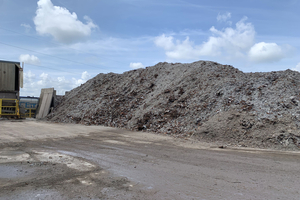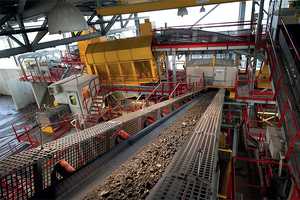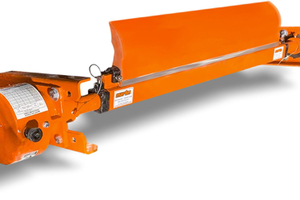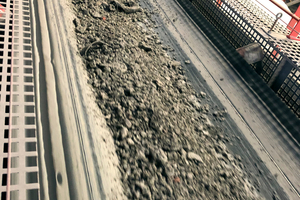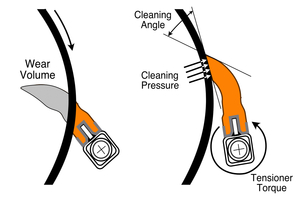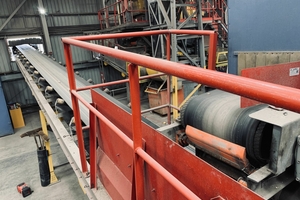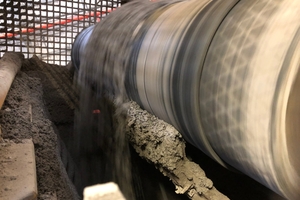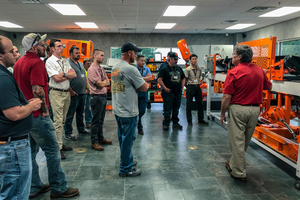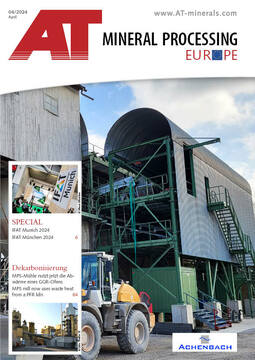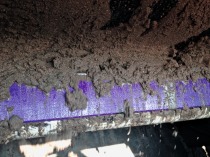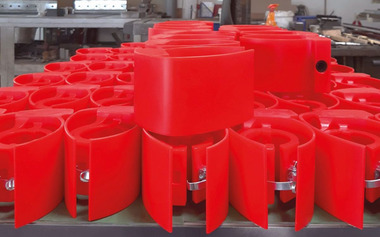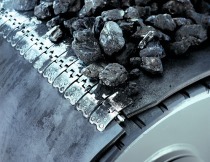Belt cleaning systems facilitate the transformation of waste incineration slag into construction aggregates
Blue Phoenix operates 11 plants in the UK stretching the length and breadth of the country, which together process more than 1.5 million tonnes of IBA each year. With operations across Europe, North America and Australia, Blue Phoenix is the world’s largest IBA processor, specialising in recovering ash residues from EfW (Energy-from-Waste) plants. The process extracts the ferrous and non-ferrous metals, then produces a range of manufactured aggregates that meet standards such as the UK’s SHW (Standard for Highways Works) 600 series for use in bulk full applications.
While it’s an impressive circularity success story, it’s not without its challenges – IBA is highly abrasive, containing a mix of concrete, glass and ceramics, with metal pieces that can rip belts and damage processing plants. Storing IBA outside means the material gets exposed to all weather conditions so it can contain substantial amounts of moisture, causing it to become sticky and hard to handle. And IBA’s cementitious properties mean that it can generate its own hotspots during storage.
This can make IBA prone to material carry-back resulting in spillages, buildups and blockages, all of which create safety risks and production inefficiencies. And that’s on top of the extreme wear and tear on conveyor systems, including issues like belt cleaner blades corroding to mainframes and tensioners seizing. To add to the processing challenges, EfW operators need to continually move their IBA on to Blue Phoenix who, in turn, must process it continually and get the manufactured aggregate out of the gate in good time.
Unscheduled downtime has serious consequences for the supply chain and so keeping plants running efficiently is critical. Furthermore, all 11 of the Blue Phoenix plants in the UK are discretely housed inside industrial units, and they each occupy a relatively small footprint, so a clean and tidy operation is paramount.
“Good housekeeping is the cornerstone of everything we do,” says Nigel Mitchell, Operations Director at Blue Phoenix UK. “Health and safety, production efficiency, plant profitability, environmental impact, you name it, they are all compromised without high standards in day-to-day housekeeping. In fact, you can tell a lot about the culture of a place from its on-site housekeeping. And besides, when things are clean and tidy it’s much easier to see how a plant is running and where there are potential problems.” That’s especially the case for material spillages, buildups and blockages; all issues that Nigel and his team have been on a mission to address in partnership with Martin Engineering.
Each Blue Phoenix plant has a network of approximately 20 belts, ranging from 600 mm to 1600 mm wide, mostly fast-running, many with small head drums, and some with eddy current separators. The belts are made from PVC which is durable but can be difficult to keep clean. “We’d had belt cleaners from another supplier at most of our plants but we struggled with the lack of continual service support to ensure they performed at their optimum best.”
Having had enough of the difficulties with other suppliers, Blue Phoenix turned to Martin Engineering in 2018 which led to the installation of QC1™ “Pit Viper”primary polyurethane blades on a few critical belts at five operations. The Pit Viper is designed to achieve a higher level of productivity for the lowest cost of ownership of any urethane precleaner. Manufactured with Martin’s Constant Angle Radial Pressure (CARP) technology, its curved blade maintains consistent belt cleaning pressure as it wears, delivering effective performance throughout its life.
And besides offering outstanding belt cleaning the Pit Viper is designed to simplify blade replacement, making it possible to quickly and easily replace the blade without any specialist tools by removing and reinserting a single retaining pin – essential when abrasive materials make frequent replacement a necessity.
“We’d tried various products to keep conveyor belts clean, but as volumes increased and plants have been operating with higher throughputs it became clear that we needed a customised approach to ensure materials were flowing through our process as efficiently as possible,” said Nigel. “We were looking to partner with a provider that would take an open-minded approach, to work alongside us to understand the specific issues at each point in the process and help us solve the problems on an ongoing basis, rather than just sell us their products.”
After performing well at the first five plants, it wasn’t long before Blue Phoenix sought a national deal to install and maintain Pit Vipers throughout their national network. In addition, several of Martin’s “set-and-forget” SQC2™ secondary belt cleaners were also installed following successful trials.
As more belt cleaners were installed, and Martin’s technicians closely monitored their performance, tailored improvements were made to further optimise belt cleaning capacity, including fitting stainless steel parts to address corrosion issues. By 2021 almost every belt in the Blue Phoenix network – more than 200 conveyor belts in total – was being kept clean by a Martin system incorporating the blade and tensioner mounted on a mainframe.
Regular servicing of the blades and tensioners is key to ensuring constant cleaning pressure and this is done with the support of Martin’s nationwide service partner Wright Engineering, who built some of Blue Phoenix’s newer plants – and fitted them with Martin belt cleaners from the outset. Yet keeping the plants clean and running at their best is about a lot more than belt cleaners and periodic servicing.
Indeed, it’s the Blue Phoenix workforce that continually monitors things on the ground: “Our plant teams are the eyes and ears of productivity and they each have responsibility for a different work zone,” said Nigel. “Every member of the team takes responsibility for maintaining our high standards of housekeeping. To facilitate that we have an extensive training programme which includes, for example, virtually all of our operational employees participating in Martin Engineering’s Foundations™ seminars for belts and belt cleaners. “There’s nothing else like Foundations in the industry and it’s been an invaluable part of the training for our teams to help them understand things like preventive maintenance. Now they’re able to identify potential issues – not just relating to belt cleaners, but rollers and bearings, belt condition and mistracking, and so on – and report any issues so they can be dealt with as part of scheduled maintenance before an unscheduled breakdown happens. As a result of our work with Martin, since 2018 we reckon we’ve seen an 80 % reduction in spillage compared to the days when scrapers were not being maintained. Back then we had people sweeping the floors almost constantly – and that’s not a good use of anyone’s time, let alone the skilled people we employ,” Nigel continues.
“The belt scrapers are working really well, but what’s key is that the arrangement with Martin, and Wright too, gives us confidence in the products, and confidence in the people that we have to support us, to both maintain and continuously improve the performance of our plants. Every challenge we’ve thrown at the Martin Engineering team has resulted in them coming up with a solution. Thanks to open dialogue and a partnership mindset between Martin Engineering and Blue Phoenix, a bespoke approach and a drive for continuous improvement is helping to maintain productivity in a sector that is proud to deliver circularity.”

